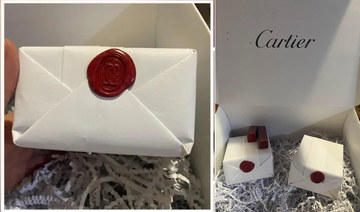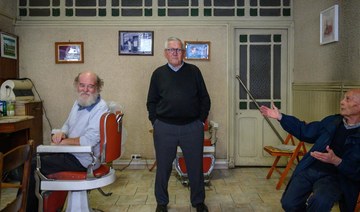CINCINNATI: Jerry Springer, the onetime mayor and news anchor whose namesake TV show featured a three-ring circus of dysfunctional guests willing to bare all — sometimes literally — as they brawled and hurled obscenities before a raucous audience, died Thursday at 79.
At its peak, “The Jerry Springer Show” was a ratings powerhouse and a US cultural pariah, synonymous with lurid drama. Known for chair-throwing and bleep-filled arguments, the daytime talk show was a favorite American guilty pleasure over its 27-year run, at one point topping Oprah Winfrey’s show.
Springer called it “escapist entertainment,” while others saw the show as contributing to a dumbing-down decline in American social values.
“Jerry’s ability to connect with people was at the heart of his success in everything he tried whether that was politics, broadcasting or just joking with people on the street who wanted a photo or a word,” said Jene Galvin, a family spokesperson and friend of Springer’s since 1970, in a statement. “He’s irreplaceable and his loss hurts immensely, but memories of his intellect, heart and humor will live on.”
Springer died peacefully at home in suburban Chicago after a brief illness, the statement said.
On his Twitter profile, Springer jokingly declared himself as “Talk show host, ringmaster of civilization’s end.” He also often had told people, tongue in cheek, that his wish for them was “may you never be on my show.”
After more than 4,000 episodes, the show ended in 2018, never straying from its core salaciousness: Some of its last episodes had such titles as “Stripper Sex Turned Me Straight,” “Stop Pimpin’ My Twin Sister,” and “Hooking Up With My Therapist.”
In a “Too Hot For TV” video released as his daily show neared 7 million viewers in the late 1990s, Springer offered a defense against disgust.
“Look, television does not and must not create values, it’s merely a picture of all that’s out there — the good, the bad, the ugly,” Springer said, adding: “Believe this: The politicians and companies that seek to control what each of us may watch are a far greater danger to America and our treasured freedom than any of our guests ever were or could be.”
He also contended that the people on his show volunteered to be subjected to whatever ridicule or humiliation awaited them.
Gerald Norman Springer was born Feb. 13, 1944, in a London underground railway station being used as a bomb shelter. His parents, Richard and Margot, were German Jews who fled to England during the Holocaust, in which other relatives were killed in Nazi gas chambers. They arrived in the United States when their son was 5 and settled in the Queens borough of New York City, where Springer got his first Yankees baseball gear on his way to becoming a lifelong fan.
He studied political science at Tulane University and got a law degree from Northwestern University. He was active in politics much of his adult life, mulling a run for governor of Ohio as recently as 2017.
He entered the arena as an aide in Robert F. Kennedy’s ill-fated 1968 presidential campaign. Springer, working for a Cincinnati law firm, ran unsuccessfully for Congress in 1970 before being elected to city council in 1971.
In 1974 — in what The Cincinnati Enquirer reported as “an abrupt move that shook Cincinnati’s political community” — Springer resigned. He cited “very personal family considerations,” but what he didn’t mention was a vice probe involving prostitution. In a subsequent admission that could have been the basis for one of his future shows, Springer said he had paid prostitutes with personal checks.
Then 30, he had married Micki Velton the previous year. The couple had a daughter, Katie, and divorced in 1994.
Springer quickly bounced back politically, winning a council seat in 1975 and serving as mayor in 1977. He later became a local television politics reporter with popular evening commentaries. He and co-anchor Norma Rashid eventually helped build NBC affiliate WLWT-TV’s broadcast into the Cincinnati market’s top-rated news show.
Springer began his talk show in 1991 with more of a traditional format, but after he left WLWT in 1993, it got a sleazy makeover.
TV Guide ranked it No. 1 on a list of “Worst Shows in the History of Television,” but it was ratings gold. It made Springer a celebrity who would go on to host a liberal radio talk show and “America’s Got Talent,” star in a movie called “Ringmaster,” and compete on “Dancing With the Stars.”
“With all the joking I do with the show, I’m fully aware and thank God every day that my life has taken this incredible turn because of this silly show,” Springer told Cincinnati Enquirer media reporter John Kiesewetter in 2011.
Well in advance of Donald Trump’s political rise from reality TV stardom, Springer mulled a Senate run in 2003 that he surmised could draw on “nontraditional voters,” people “who believe most politics are bull.”
“I connect with a whole bunch of people who probably connect more to me right now than to a traditional politician,” Springer told the AP at the time. He opposed the war on Iraq and favored expanding public health care, but ultimately did not run.
Springer also spoke often of the country he came to age 5 as “a beacon of light for the rest of world.”
“I have no other motivation but to say I love this country,” Springer said to a Democratic gathering in 2003.
Springer hosted a nationally syndicated “Judge Jerry” show in 2019 and continued to speak out on whatever was on his mind in a podcast, but his power to shock had dimmed in the new era of reality television and combative cable TV talk shows.
“He was lapped not only by other programs but by real life,” David Bianculli, a television historian and professor at Monmouth University, said in 2018.
Despite the limits Springer’s show put on his political aspirations, he embraced its legacy. In a 2003 fund-raising infomercial ahead of a possible US Senate run the following year, Springer referenced a quote by then National Review commentator Jonah Goldberg, who warned of new people brought to the polls by Springer, including “slack-jawed yokels, hicks, weirdos, pervs and whatnots.”
In the informercial, Springer referred to the quote and talked about wanting to reach out to “regular folks ... who weren’t born with a silver spoon in your mouth.”
Jerry Springer, politician turned TV ringmaster, dies at 79
https://arab.news/vc23d
Jerry Springer, politician turned TV ringmaster, dies at 79

- Springer died peacefully at home in suburban Chicago after a brief illness, statement said
A 98-year-old in Ukraine walked miles to safety from Russians, with slippers and a cane
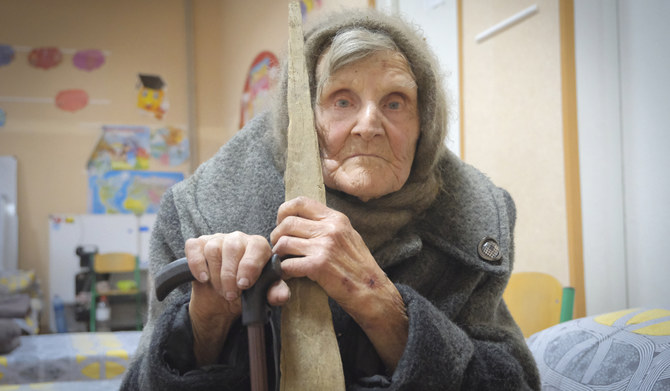
- Describing her journey, the nonagenarian said she had fallen twice and was forced to stop to rest at some points, even sleeping along the way before waking up and continuing her journey
KYIV, Ukraine: A 98-year-old woman in Ukraine who escaped Russian-occupied territory by walking almost 10 kilometers (6 miles) alone, wearing a pair of slippers and supported by a cane has been reunited with her family days after they were separated while fleeing to safety.
Lidia Stepanivna Lomikovska and her family decided to leave the frontline town of Ocheretyne, in the eastern Donetsk region, last week after Russian troops entered it and fighting intensified.
Russians have been advancing in the area, pounding Kyiv’s depleted, ammunition-deprived forces with artillery, drones and bombs.
“I woke up surrounded by shooting all around — so scary,” Lomikovska said in a video interview posted by the National Police of Donetsk region.
In the chaos of the departure, Lomikovska became separated from her son and two daughters-in-law, including one, Olha Lomikovska, injured by shrapnel days earlier. The younger family members took to back routes, but Lydia wanted to stay on the main road.
With a cane in one hand and steadying herself using a splintered piece of wood in the other, the pensioner walked all day without food and water to reach Ukrainian lines.
Describing her journey, the nonagenarian said she had fallen twice and was forced to stop to rest at some points, even sleeping along the way before waking up and continuing her journey.
“Once I lost balance and fell into weeds. I fell asleep … a little, and continued walking. And then, for the second time, again, I fell. But then I got up and thought to myself: “I need to keep walking, bit by bit,’” Lomikovska said.
Pavlo Diachenko, acting spokesman for the National Police of Ukraine in the Donetsk region, said Lomikovska was saved when Ukrainian soldiers spotted her walking along the road in the evening. They handed her over to the “White Angels,” a police group that evacuates citizens living on the front line, who then took her to a shelter for evacuees and contacted her relatives.
“I survived that war,’ she said referring to World War II. “I had to go through this war too, and in the end, I am left with nothing.
“That war wasn’t like this one. I saw that war. Not a single house burned down. But now – everything is on fire,” she said to her rescuer.
In the latest twist to the story, the chief executive of one of Ukraine’s largest banks announced on his Telegram channel Tuesday that the bank would purchase a house for the pensioner.
“Monobank will buy Lydia Stepanivna a house and she will surely live in it until the moment when this abomination disappears from our land,” Oleh Horokhovskyi said.
Amazon Purr-rime: Cat accidentally shipped to online retailer

- Galena was found safe by a warehouse worker at an Amazon center after vanishing from her home in Utah
LOS ANGELES: A curious cat that sneaked into an open box was shipped across the United States to an Amazon warehouse after its unknowing owners sealed it inside.
Carrie Clark’s pet, Galena, vanished from her Utah home on April 10, sparking a furious search that involved plastering “missing” posters around the neighborhood.
But a week later, a vet hundreds of miles (kilometers) away in Los Angeles got in touch to say the cat had been discovered in a box — alongside several pairs of boots — by a warehouse worker at an Amazon center.
“I ran to tell my husband that Galena was found and we broke down upon realizing that she must have jumped into an oversized box that we shipped out the previous Wednesday,” Clark told KSL TV in Salt Lake City.
“The box was a ‘try before you buy,’ and filled with steel-toed work boots.”
Clark and her husband jetted to Los Angeles, where they discovered Amazon employee Brandy Hunter had rescued Galena — a little hungry and thirsty after six days in a cardboard box, but otherwise unharmed.
“I could tell she belonged to someone by the way she was behaving,” said Hunter, according to Amazon.
“I took her home that night and went to the vet the next day to have her checked for a microchip, and the rest is history.”
What did people eat before agriculture? New study offers insight
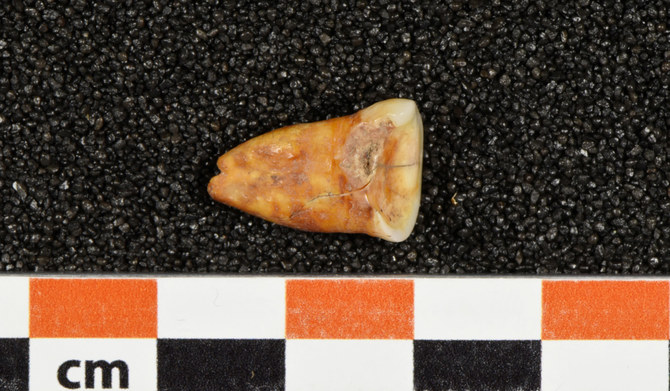
- Analysis of forms — or isotopes — of elements including carbon, nitrogen, zinc, sulfur and strontium in these remains indicated the type and amount of plants and meat they ate
WASHINGTON: The advent of agriculture roughly 11,500 years ago in the Middle East was a milestone for humankind — a revolution in diet and lifestyle that moved beyond the way hunter-gatherers had existed since Homo sapiens arose more than 300,000 years ago in Africa.
While the scarcity of well-preserved human remains from the period preceding this turning point has made the diet of pre-agricultural people a bit of a mystery, new research is now providing insight into this question. Scientists reconstructed the dietary practices of one such culture from North Africa, surprisingly documenting a heavily plant-based diet.
The researchers examined chemical signatures in bones and teeth from the remains of seven people, as well as various isolated teeth, from about 15,000 years ago found in a cave outside the village of Taforalt in northeastern Morocco. The people were part of what is called the Iberomaurusian culture.
Analysis of forms — or isotopes — of elements including carbon, nitrogen, zinc, sulfur and strontium in these remains indicated the type and amount of plants and meat they ate. Found at the site were remains from different edible wild plants including sweet acorns, pine nuts, pistachio, oats and legumes called pulses. The main prey, based on bones discovered at the cave, was a species called Barbary sheep.
“The prevailing notion has been that hunter-gatherers’ diets were primarily composed of animal proteins. However, the evidence from Taforalt demonstrates that plants constituted a big part of the hunter-gatherers’ menu,” said Zineb Moubtahij, a doctoral student in archaeology at the Max Planck Institute for Evolutionary Anthropology in Germany and lead author of the study published on Monday in the journal Nature Ecology & Evolution.
“It is important as it suggests that possibly several populations in the world already started to include substantial amount of plants in their diet” in the period before agriculture was developed, added archeogeochemist and study co-author Klervia Jaouen of the French research agency CNRS.
The Iberomaurusians were hunter-gatherers who inhabited parts of Morocco and Libya from around 25,000 to 11,000 years ago. Evidence indicates the cave served as a living space and burial site.
These people used the cave for significant portions of each year, suggesting a lifestyle more sedentary than simply roaming the landscape searching for resources, the researchers said. They exploited wild plants that ripened at different seasons of the year, while their dental cavities illustrated a reliance on starchy botanical species.
Edible plants may have been stored by the hunter-gatherers year-round to guard against seasonal shortages of prey and ensure a regular food supply, the researchers said.
These people ate only wild plants, the researchers found. The Iberomaurusians never developed agriculture, which came relatively late to North Africa.
“Interestingly, our findings showed minimal evidence of seafood or freshwater food consumption among these ancient groups. Additionally, it seems that these humans may have introduced wild plants into the diets of their infants at an earlier stage than previously believed,” Moubtahij said.
“Specifically, we focused on the transition from breastfeeding to solid foods in infants. Breast milk has a unique isotopic signature, distinct from the isotopic composition of solid foods typically consumed by adults.”
Two infants were among the seven people whose remains were studied. By comparing the chemical composition of an infant’s tooth, formed during the breastfeeding period, with the composition of bone tissue, which reflects the diet shortly before death, the researchers discerned changes in the baby’s diet over time. The evidence indicated the introduction of solid foods at around the age of 12 months, with babies weaned earlier than expected for a pre-agricultural society.
North Africa is a key region for studying Homo sapiens evolution and dispersal out of Africa.
“Understanding why some hunter-gatherer groups transitioned to agriculture while others did not can provide valuable insights into the drivers of agricultural innovation and the factors that influenced human societies’ decisions to adopt new subsistence strategies,” Moubtahij said.
Palestinian prisoner in Israel wins top fiction prize

- The mask in the novel’s title refers to the blue identity card that Nur, an archaeologist living in a refugee camp in Ramallah, finds in the pocket of an old coat belonging to an Israeli
ABU DHABI: Palestinian writer Basim Khandaqji, jailed 20 years ago in Israel, won a prestigious prize for Arabic fiction on Sunday for his novel “A Mask, the Color of the Sky.”
The award of the 2024 International Prize for Arabic Fiction was announced at a ceremony in Abu Dhabi.
The prize was accepted on Khandaqji’s behalf by Rana Idriss, owner of Dar Al-Adab, the book’s Lebanon-based publisher.
Khandaqji was born in the Israeli-occupied West Bank city of Nablus in 1983, and wrote short stories until his arrest in 2004 at the age of 21.
He was convicted and jailed on charges relating to a deadly bombing in Tel Aviv, and completed his university education from inside jail via the Internet.
The mask in the novel’s title refers to the blue identity card that Nur, an archaeologist living in a refugee camp in Ramallah, finds in the pocket of an old coat belonging to an Israeli.
Khandaqji’s book was chosen from 133 works submitted to the competition.
Nabil Suleiman, who chaired the jury, said the novel “dissects a complex, bitter reality of family fragmentation, displacement, genocide, and racism.”
Since being jailed Khandaqji has written poetry collections including “Rituals of the First Time” and “The Breath of a Nocturnal Poem.”
He has also written three earlier novels.
Mexican doctor claims victory in $28 Cartier earrings battle
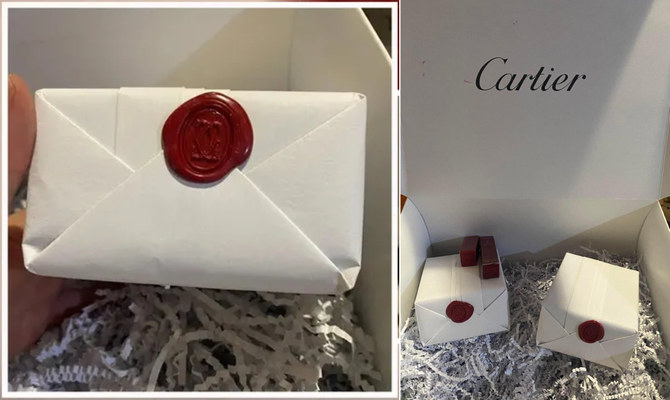
MEXICO CITY: A Mexican man has claimed a victory over French luxury brand Cartier, saying an error allowed him to buy two pairs of earrings for $28 that were supposed to cost nearly $28,000.
After a four-month struggle, doctor Rogelio Villarreal said he had finally received the jewelry, which he accused the company of refusing to deliver after his online purchase in December.
According to Villarreal, he came across the low-priced earrings while browsing Instagram.
“I swear I broke out in a cold sweat,” he wrote on the social media platform X.
Cartier declined to recognize the purchase and offered Villarreal a refund, as well as a bottle of champagne and a passport holder as compensation, according to a company letter shared by the doctor.
But Villarreal refused and decided to take the case to Mexico’s consumer protection agency, which ruled in favor of the doctor.
Cartier accepted the decision, Villarreal announced.
“War is over. Cartier is complying,” he wrote.







